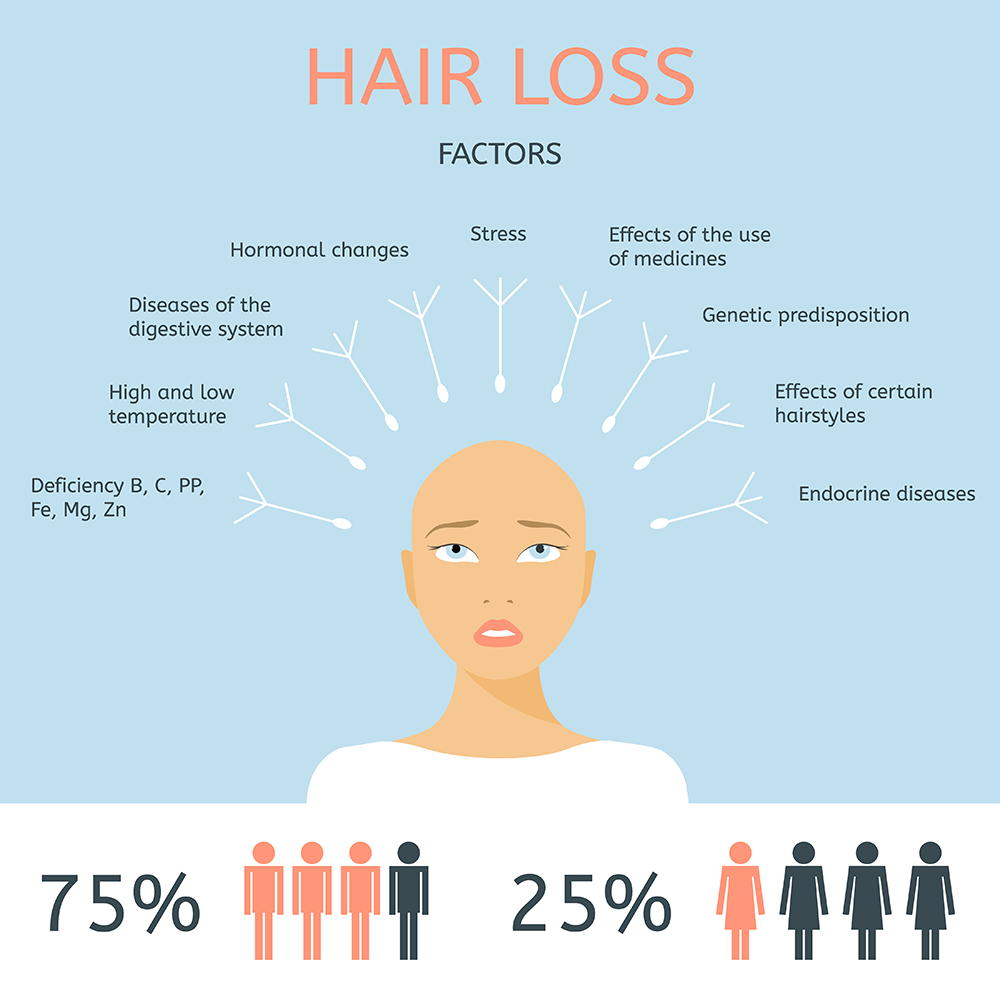
DIAGNOSIS of HAIR LOSS
Hair loss has been transformed from a condition once thought of as a men’s health and cosmetic concern, to now being understood as a condition that affects an alarming number of both genders. As many as 85 percent of men and 40 percent of women develop hair thinning by the age of 50 years old. Over thirty million U.S. women suffer from hair loss, including PA Sophia Michelle. She understands the impact of hair thinning far too well. After her first child was born, she noticed diffuse hair thinning that would only partially recover after each child’s birth. Three children later, combined with a stressful divorce, she found herself with severe thinning in the frontal area, just behind the hairline, and temporal thinning.
The emotional impact of hair loss is powerful. Often PA Sophia Michelle hears from her clients the same expression of frustration. They say hair thinning at a young age is like “waking up one day, looking in the mirror, and feeling like I’ve aged forty years.” They report feeling embarrassed, hopeless and lost, not knowing how to stop the progression of hair loss and further lowered self-confidence. All too often, people are left struggling with where to spend their money on treatment, or wondering whether it is worth spending time and money on therapies at all. The overwhelming amount of information and misinformation about hair restoration treatments leads many people to conclude that there aren’t any worthwhile treatments available. They are left to deal with their hair loss by wearing wigs or hats, feeling unhappy with their appearance or even isolating themselves socially.
But passion leads to change, and as someone who has personally experienced hair loss, PA Sophia Michelle could not be more passionate about providing truly effective treatment for hair thinning. One of her core career goals is to help as many women and men as possible achieve their highest hair health potential. When you choose our practice for your hair loss diagnosis and treatment, you can feel confident that you will receive expert care and trusted services for your hair concerns. PA Sophia Michelle will meet with you personally for a consultation, help you understand the cause of your hair loss and recommend the best, proven effective treatments for your needs. Call us today at 214-500-9287 to make your appointment at our offices in Dallas, Texas.
Hair Loss Diagnosis and Treatment with PA Sophia Michelle
Over the course of her career, PA Sophia Michelle has meticulously reviewed the gold standards of diagnosis and treatment for the conditions she treats. Her years as a leading Assistant Professor teaching advanced practice providers about the art of making a medical decision has given her an edge over her colleagues. Studies that purport to produce statistically significant evidence are becoming more common. Unfortunately, too many studies lack the proper scientific methods required to reduce bias and provide results that can be relied upon. Billions of dollars are spent every year in advertisements in the aesthetic and medical industry. Deciphering the marketing ploys can be a daunting task, even for leading research experts such as PA Sophia Michelle. To optimize her clients’ care, she has ensured that every method and product line she recommends undergoes a detailed review, and remains to be the optimal scientific and non-toxic therapy. Her evidence-based methods of analysis were developed from her studies at Oxford University, U.K. She then advanced her skill in this area by teaching Evidence-Based Medicine as an Assistant Professor at The University of Texas Southwestern Medical Center.
While we know that the hair loss treatments we provide are highly effective and thoroughly vetted, we also understand that hair restoration may not work without understanding why a patient’s hair has been thinning. In fact, part of the reason our treatments are so effective is because we take extra time and care to identify the cause of our patients’ hair loss. Hair loss diagnosis is therefore a key component of our hair loss services. We want our clients to not only receive the most effective treatments, but also understand the reasons behind their hair loss — this empowers them to take care of their hair and their bodies for longer-lasting results and wellness.
We provide a range of diagnostic services for both female and male hair loss. Take the opportunity to learn more about the types of hair loss we diagnose and treat below, or to read about the causes of hair loss, methods to reduce damage and treatments to minimize hair loss on our hair loss treatment pages. We also invite you to call us whenever you feel ready to talk to a professional about your hair loss and your treatment options.
Female Hair Loss
Since hair loss has historically been associated with men, it is often even more confusing, embarrassing and disheartening for women. They may feel as though it makes them less feminine, or they may feel particularly alone in their struggle as there are fewer resources and media messages for women experiencing hair loss. Women may also be told that it is simply a normal part of aging, especially if their hair loss is linked to pregnancy or menopause. Women often find it difficult to feel confident and beautiful as their bodies change over time, and hair loss is just one of the many cosmetic concerns that can leave women with lowered self-esteem.
Women’s hair loss is most often caused by two common conditions:
- Androgenetic Alopecia. Also called female pattern hair loss, androgenetic alopecia in women is most often takes the form of general hair thinning across the scalp. Pattern hair loss is hereditary and symptoms usually begin in women around middle age.
- Telogen Effluvium. Telogen effluvium is brought on by environmental conditions. It is characterized by the sudden loss of hair due to premature hair follicle dormancy, which is caused by hormone shifts, illness or extreme stress.
Male Hair Loss
Male hair loss is incredibly prevalent in men as they age, typically beginning in their mid to late 20s and occurring in most men before age 50. For many men, it is one of the first signs of aging that feels undistinguished or unwanted. It can be difficult to adjust to the feeling of looking older, especially for men who feel as though their hair loss makes them look older than they are. A full head of hair is often touted as a sign of male health and good looks, so hair loss can lower a man’s confidence in his appearance as well as his deeper sense of self-worth.
The most common cause of hair loss in men is androgenetic alopecia, also called male pattern hair loss or male pattern balding. In men, androgenetic alopecia typically takes the form of hair thinning at the front of the scalp, the crown of the head and the temples. It may look like a receding hairline or may be a more distinct bald patch at the back of the head.
Lab Work for Hair Loss
Most types of hair loss are influenced by biological factors like hormones, glandular activities, nutritional deficiencies or other broader health concerns. PA Sophia Michelle provides thorough blood tests and other lab work to help you identify any health imbalances that may be influencing your hair loss. Our lab work analyzes a variety of concerns, including:
- Male and female sex hormones like testosterone, estrogen and progesterone
- Iron
- Thyroid activity
- Cortisol
- Inflammatory conditions
- Diabetes and insulin and glucose levels
- Electrolyte imbalances (kidney and liver function)
Understanding these biological factors can tell us more about how your health or lifestyle may be influencing your hair loss. We can work with you to recommend changes in areas like diet, medications or exercise to help you get the best results from your hair treatments.
Pattern of Hair Loss Correlates with Cause
Along with lab work, we can often make predictions about patients’ hair loss based on the placement of balding or thinning patches. Genetically based male pattern hair loss, for example, typically manifests as a receding hairline or a rounded thin area at the crown of the head. Hormonal or stress-related hair loss in women may look more like general thinning or thinning in seemingly random patches.
PA Sophia Michelle will thoroughly evaluate your hair loss during your consultation. With her experience and expertly trained eye, she can identify the possible causes of your thinning hair and recommend further tests or treatments that will give you thorough, long-lasting results.
Schedule Your Consultation
If you are interested in hair loss treatments or other aesthetic services in Dallas, Texas, PA Sophia Michelle and her talented team are ready to welcome you to our comfortable offices for your consultation. We work personally with every client to learn about their goals and their concerns, and to create a customized plan of treatments and services to help them achieve their best outcomes. We are here to help you get back your confidence, and in turn improve your energy, positivity and overall health. Call today at 214-500-9287 or use our online form to get in touch.
